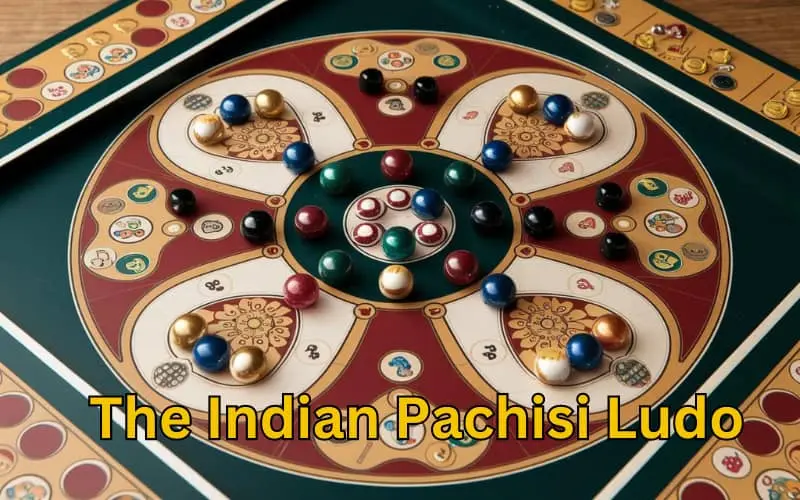The game of The Indian Pachisi Ludo is more than just a popular pastime—it represents centuries of cultural history, blending tradition with modern entertainment. Originating in ancient India, Pachisi is the predecessor of the board game we now know as Ludo. With its roots deep in Indian history, Pachisi was not only a game but also a reflection of social interactions and strategies that played a significant role in the lives of its players. Over time, this game evolved into Ludo, which has now become one of the best-known and played board games worldwide.
This article delves into the origins, evolution, and modern form of The Indian Pachisi Ludo, shedding light on its cultural significance and how it continues to engage players of all ages.
Origins of The Indian Pachisi Ludo
The origins of The Indian Pachisi date back more than 1,500 years, during the time of ancient India’s Gupta Empire. Pachisi, often referred to as the “game of kings,” was widely played in royal courts and amongst nobility. It was more than just a recreational activity—it was a symbol of strategy, patience, and sometimes even political maneuvering.
Players traditionally played the game on a cross-shaped board made from cloth or embroidered materials. The word “Pachisi” comes from the Hindi word “pachis,” meaning twenty-five, which is the highest score one can roll with the cowrie shells used as dice in the game. The goal of Pachisi was to move all of your pieces around the board and back to the center, similar to modern Ludo but with more complex rules and strategies involved.
The ancient Indian game was not only popular among the masses but also enjoyed by royals. Historical records suggest that the famous Mughal Emperor Akbar was particularly fond of Pachisi, often playing it on life-sized boards with human pieces. These sessions of The Indian Pachisi were held in lavish royal gardens, further elevating the game’s status.
Evolution of Pachisi into Ludo
As time passed and British colonialism spread across India, The Indian Pachisi Ludo underwent significant changes. The British, fascinated by the game, adapted it to better suit Western sensibilities and simplify the rules for broader audiences. This modified version eventually became the game of Ludo, patented in England in 1896 by Alfred Collier.
Ludo simplified many of Pachisi’s original rules. For instance, instead of using cowrie shells as dice, Ludo introduced the six-sided die still used today. The game board streamlined into a standard four-color square board, and the complex rules of movement and captures in Pachisi became easier for family-friendly play.
While Pachisi allowed for up to four players and involved a mix of strategy and chance, Ludo leaned more heavily toward chance due to the dice rolls. The use of tokens instead of human pieces and a fixed board made Ludo a more portable and accessible version of The Indian Pachisi, appealing to a wider audience across different cultures.
Modern Ludo: A Global Phenomenon
Today, the Indian Pachisi Ludo is known simply as Ludo and has grown into a global phenomenon. People of all ages love the game, and it remains a staple in households worldwide. The simplicity of Ludo, combined with its competitive nature, makes it an appealing choice for family gatherings, casual play, and even competitive tournaments.
In the digital age, Ludo has expanded beyond the traditional board. Numerous mobile apps, online platforms, and digital versions of Ludo have emerged, allowing people to play the game anytime, anywhere. Whether it’s competing against friends or facing off against strangers from around the globe, the digital versions have brought new life to the age-old tradition of Pachisi.
What makes The Indian Pachisi Ludo so timeless is its universal appeal. While Pachisi was originally a game of strategy and wit, Ludo adds a modern twist with faster gameplay and accessible rules, making it an ideal game for players of all skill levels. Ludo’s adaptability to different platforms—whether on a board or a screen—ensures its continued relevance in today’s fast-paced world.
Cultural Significance of The Indian Pachisi Ludo
The cultural significance of the Indian Pachisi Ludo cannot be overstated. Pachisi was a reflection of ancient Indian society, rummy dhan where strategic thinking and competition were highly valued. The game also symbolized unity and interaction, as it brought people together for moments of leisure and intellectual engagement. Royals, nobles, and commoners alike enjoyed the game, contributing to its long-lasting presence in Indian culture.
Ludo, the modern iteration of Pachisi, continues to carry forward this legacy. While the rules have changed, the spirit of friendly competition remains. In many households, playing Ludo is a cherished tradition that spans generations, offering moments of joy and bonding. It’s a game that transcends boundaries, having evolved from an ancient Indian game to a global classic.
Conclusion
The journey of the Indian Pachisi Ludo from its origins in ancient India to the modern, globally beloved game of Ludo is a testament to its enduring appeal in rainbow rummy. What began as a game played by Indian royals has transformed into a household favorite that continues to entertain and bring people together across different cultures and countries.
Ludo’s evolution from Pachisi highlights how games adapt and grow over time while preserving the essence of their original purpose—bringing joy, promoting strategy, and creating connections among players. As it continues to evolve in the digital age, the Indian Pachisi Ludo remains a symbol of cultural heritage and modern entertainment, showing that some traditions are truly timeless.








